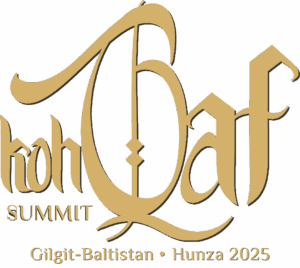The name “kohQaf” comes from the mythical mountain of the Faerie, which is also mentioned in Fariduddin Attar’s epic poem: “The Conference of the Birds” as being the hidden abode of Simurgh, the king of all birds and the goal of all knowledge; and reference to which exist in folk-tales across Central-Asia, the Karakoram Range and the Pamirs.
Origination
The kohQaf Summit | Hunza – 2025 is a visionary initiative designed to leverage culture as a tool for soft power and diplomacy; fostering climate resilience, strengthening economic partnerships, promoting sustainable tourism, and mobilizing investment within Gilgit-Baltistan – region of unparalleled geopolitical and environmental significance located at the confluence of the Himalayas, Karakoram, and Hindu Kush mountain ranges. The festival will serve as a dynamic platform to connect visionaries, artists, policymakers, entrepreneurs, academia, leaders, and tourists from around the globe, fostering meaningful dialogue on climate resilience, sustainable development, trade, tourism, leadership, and cultural integration.
By incorporating traditional and contemporary experiences, the kohQaf Summit will not only showcase Gilgit-Baltistan’s vibrant traditions but also position the region as a global hub for cultural exchange, economic growth, and innovation. Through its focus on youth empowerment, cross-cultural dialogue, and sustainable practices, the festival aims to create a lasting legacy for Gilgit-Baltistan, driving economic progress, as well as local and international collaboration.
Vision & Mission
Vision
To establish the kohQaf Summit as a premier summit platform for nurturing and leveraging culture to create economic partnerships, foster innovation, and promote sustainable development.
Mission
- To promote Pakistan as a global destination for tourism, trade, and investment.
- To showcase Gilgit-Baltistan’s unique cultural identity through music, art, crafts, dialogue and cuisine.
- To create opportunities for partnerships between governments, educational institutions, civil society, and the private sector.
- To empower local communities through education, innovation, and entrepreneurship.

